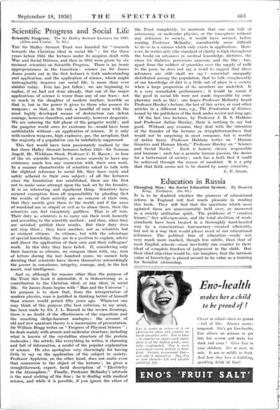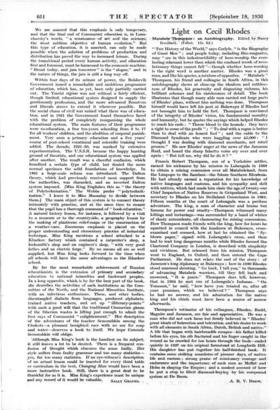Education in Russia
IT is to be doubted whether the pioneers of educational reform in England will find much pleasure in reading this book. They will find that the questions which most agitated them are unaccountably held over, or answered in a strictly utilitarian spirit. The problems of " creative leisure," free self-expression, and the total abolition of work- standards have been treated in a thoroughly hard-headed way by a conscientious bureaucracy—treated efficiently, but not in a way that would please most of our educational reformers. The political bias of education—really not very much more marked, though less subtle, than that of most English' schools—must inevitably run counter to their ideal of complete freedom of judgement in the child. But their chief objection would be, one imagines, that the intrinsic value of knowledge is placed second to its value as a training for Socialist citizenship.
We are assured that this emphasis is only temporary, and that the final end of Communist education is, in Luna- eharsky's words, " a renaissance of art, and the sciences; the Most sublime objective of human evolution." But this type of education, it is asserted, can only be made possible when the solution of problems of production and distribution has paved the way to increased leisure. During the transitional period every human. activity, and eclucation first and foremost, must be harnessed to the economic machine. t• Bread today, and jam tomorrow " is the "slogan," and in the nature of things, the jam is still a long way off.
Within four days of its seizure of power, the Bolshevik Government issued a remarkable and ambitious programme of education, which has, as yet, been only partially carried out. The Tsarist regime was not without a' fairly efficient, though limited, educational system designed to supply the gentlemanly professions, and the more advanced Zemstvos and liberals strove to extend it wherever possffile. But
the social chaos of civil war ruined' what there was of educa- tion, and in 1921 the Government found themselves faced with the problem of completely reorganising the whole educational system. The main features of their programme were co-education, a free ten-years schooling from 8 to 17 for all workers' children, and the abolition of corporal punish- ment. Very soon a primary education and a five years' course of post-school vocational and scientific training were added. The decade, 1921-30, was marked by extensive experimentation. The U.S.S.R. became the happy hunting ground of theorists, and one educational system was applied after another. The result was a cheerful confusion, which benefited a certain type of child, but denied the more formal specimen the solid foundations of knowledge. In 1931 a large-scale reform was introduced. The Dalton theory, which had previously received most_ support from the authorities, was discarded, and an inverted Dalton
,system imposed. [Miss King Rnglishes, this as " the theory of Polytechnisation." The Webbs prefer " polytechnik-
isation." I leave it to -Miss Macaulay to decide between them.] The main object of this system is to connect theory intimately with practice, and at the same time to ensure that the pupil has a thorough command of " book-education."
A natural history lesson, for instance, is followed by a visit .to a museum or to the countryside, a geography lesson by the making of plasticene. relief-maps or the -construction of a weather-vane. Enormous emphasis is placed on the proper understanding and elementary practice of. industrial technique. Miss King mentions a school attached to a Kharkov. factory which eontained a carpenter's shop, a locksmith's shop and an engineer's shop, " with very good lathes and an electric forge." By no means all are so well supplied, but Miss King looks forward to the time when all schools will have the same advantages as the Kharkov school.
By far the most remarkable achievement of Russian educationists is the extension of -primary and secondary education to national minorities and backward peoples. In a long appendix, which is by far the best part of the book, she describes the •activities of such institutions as the Com- mittee of the North, and the National Minorities Institute, with an infectious enthusiasm.- These, and other bodies, disentangled - dialects from languages, produced alphabets, trained .native teachers, and set up " illiteracy-points" with such a good will that the traditional Cimmerian gloom of the Siberian wastes is lifting just enough to admit the first rays of Communist " enlightenment." Her description of the adventures of the teacher Semonshkin among the -Chukots—a pleasant benighted- race with no use for soap .and water—deserves a book to itself. We' hope Comrade Semonshkin will oblige.
'Although Miss King's book is the handiest' on its subject, it still leaves a lot to be desired. There is a frequent con- fusion of thought whieh obscures the sense badly. Her style suffers from faulty grammar and too many statistics— yes, far too many statistics. If an eye-witness's description 'of an actual lesson could be inserted for every third table or curriculum in the text, Changing Man would have been a More instructive book. Still, there is a great deal to be thankful for as it is. Miss King's experience must be unique
and any record of it would be valuable. SALLY GRAVES.











































 Previous page
Previous page